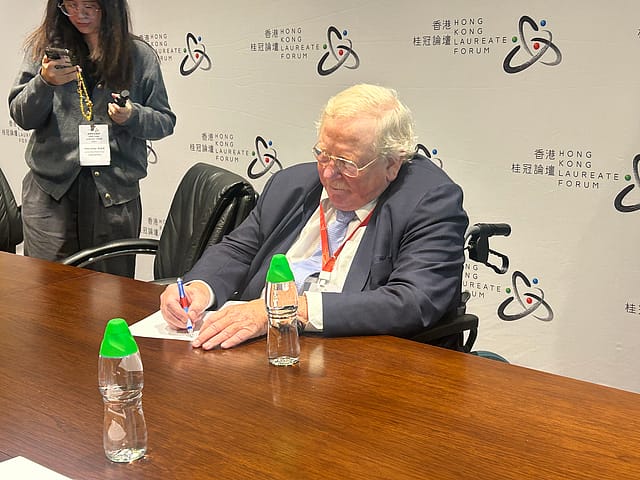Nobel laureate expects developing countries to contribute more to astrophysics research

Nobel Prize-winning German astrophysicist Reinhard Genzel says that none of the measurements he and his associates have done to study the stars, galaxies, black holes and other phenomena in space have given him any reason so far to doubt or disprove Einstein’s general relativity theory published in 1915.
The general theory of relativity had predicted black holes, the expansion of the universe and so on, and scientists continue to test these theories.
Genzel, co-director of the Max Planck Institute for Extraterrestrial Physics, told a group of journalists on the sidelines of the biennial Hong Kong Laureate Forum held in Hong Kong, a four-day event fully sponsored by the Lee Shau Kee Foundation, that he calls himself a positivist. Asked whether he becomes suspicious of the fundamentals of physics as he constantly pores through new measurements of the world beyond us, the 73-year-old said, “I don’t do that so much because I am an experimentalist. You could call me a positivist. I am of the opinion that if there is something wrong, at some point it will reveal itself through an inconsistency.” Regardless, he brought up the case of Hubble tension to argue that skepticism rises from some quarters and then builds up as time progresses. Hubble tension refers to the disagreement between two different measurements of the universe's expansion rate, the Hubble constant.
Meanwhile, at the Forum on multiple occasions, Genzel dwelt on what he described as a breakthrough in ‘optical adaptation’ very recently at the Chile observatory (run by the European Southern Observatory) to get better images of the star being studied by his team. He said four telescopes were used together to correct for atmospheric distortion to produce sharper images than any other observatory in the world.
According to its website, ESO operates several astronomical facilities in Chile, including the Paranal Observatory (housing the Very Large Telescope), the La Silla Observatory, and the Atacama Large Millimeter/submillimeter Array (ALMA) on the Chajnantor plateau. According to astronomers and multiple scientific reports, Chile is considered one of the best astronomical sites on Earth thanks to its clear and dry skies and altitude.
It's the Pits!
13 Feb 2026 - Vol 04 | Issue 58
The state of Indian cities
In 2020, Genzel and collaborator Andrea Ghez were awarded the Nobel Prize in Physics jointly for their work on the supermassive black hole, Sagittarius A*, which is at the centre of the Milky Way. Genzel had worked in the field for nearly 30 years using ESO telescopes.
The second edition of the Hong Kong Laureate Forum saw participation of Shaw Prize winners and 200 young scientists in life sciences, astronomy and mathematical sciences as the city strives to showcase its capabilities as a global hub of scientific research. The Shaw Prize was constituted in 2002 and Genzel was a recipient of the award in 2008.
Genzel also decried a decline in internationalism in research and said that he was not an admirer of the way the US under Donald Trump was going about doing things in the field of science and technology.
The Nobel laureate said that he was not excited about getting students to write exams anymore because an evaluator is often left to wonder whether it was the AI chatbot or the candidate who actually wrote it, leaving him or her to rely on oral evaluations of students to assess their standards.
He also expressed hope in countries in the East to contribute largely to astrophysics as they begin to invest more in the segment and promote research. He wanted to be an archaeologist and then decided to study physics, much to the delight of his father. He also spoke about the importance of mentorship. He said he had two mentors — first his father Ludwig Genzel, himself a physicist, and then Charles Townes, a Nobel laureate who went on to deeply influence him and also taught him astrophysics and compassion. Genzel said Townes was the reason why the US didn’t pursue Star Wars during the height of the Cold War with the Soviet Union. Townes, he said, persuaded the US leadership to instead give peace a chance.
